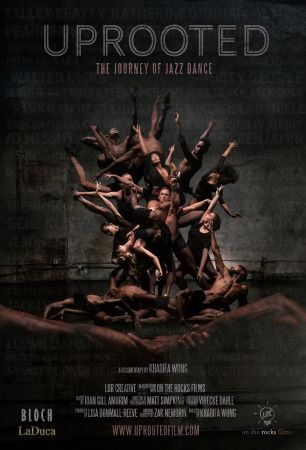
Uprooted: The Journey of Jazz Dance 2020
Distributed by Good Docs
Produced by Lisa Donmall-Reeve and Kimberley Browning
Directed by Khadifa Wong
DVD, 94 mins
College - General Adult
African American History; African American Studies; Dance
Date Entered: 06/15/2023
Reviewed by Linda Dempf, Music and Media Librarian, The College of New JerseyWhen you think of jazz dance, names like Bob Cole, Jerome Robbins, and Bob Fosse might come to mind. Khadifa Wong’s timely documentary Uprooted: The Journey of Jazz Dance challenges this white choreographic lineage while acknowledging the missing voices that are integral to its history. Through interviews with leading choreographers, dancers, dance educators, and scholars, the film traces the roots of jazz dance to African diasporic culture and shows the largely forgotten role that African Americans played in each stage of jazz dance’s evolution. Dances such as the Juba and the Shika were brought to this country by enslaved people of West Africa, whose dance and music was essentially the only element of their culture that they could retain. Social dances such as the cakewalk, and later Lindy Hop and Swing, retained this sense of syncopation, improvisation, and surprise, which became the foundation of dance on Broadway and in Hollywood musicals. These early forms of jazz dance also did the work of political resistance while expressing joy, humor, and a sense of community.
The film is truly a journey, with interviews, historical footage and stills providing the narrative history of jazz dance against a backdrop of what was happening historically and politically in this country--from slavery, segregation, the civil rights movement, the AIDS crisis--through some of the politics of hip hop today. Woven into this narrative is more recent footage of dance in rehearsals and classes, showing the beauty and variety of what jazz dance is now. The documentary raises many issues as to why the history and roots of jazz dance have been forgotten, including cultural appropriation and the hierarchy and cultural dominance of western forms of dance such as ballet. It also discusses many of the missing black and brown voices of choreographers and dancers such as Pepsi Bethel, Fred Benjamin, Jo Jo Smith, and Frank Hatchett. Even more dancers are given voice in a series of stills, pointing to the rich history of jazz dance yet to be uncovered.
This film is an excellent introduction to a truly American dance form, while decentering whiteness and raising broader issues of racial bias and cultural hierarchies. It has wide appeal and would be suitable for classes in dance, African American studies, American studies, cultural studies, and history.
Awards: Best of Fest Feature, Dance on Camera Film Festival; Best of Fest Feature Audience Award, San Francisco Dance Film Festival; Best Musical Documentary Award, Rhode Island International Film Festival; Best Documentary Award, Pan African Film Festival; Best Documentary Award, The Micheaux Film Festival; Best Documentary Award, Black Star International Film Festival; Audience Choice Feature Film Award, Greater Cleveland Urban Film Festival; Festival Winner and Audience Choice Award, Skyline Indie Film Festival; Audience Choice, Dancinema; Best Editing Award, SCAD Savannah Film Festival; Best Cinematography Award, Columbia Film Festival; Best of Fest Award, Columbia Film Festival; Audience Choice Award, Idaho Screendance Festival; Ronzo Winner, Oxford Film Festival; Best Documentary in Music and Dance, Master of Art Film Festival (Bulgaria); Best Documentary Award, New Hope Film Festival; Nominated for Best Documentary, Raindance Film Festival
Published and licensed under the Creative Commons Attribution 4.0 license. Anyone can use these reviews, so long as they comply with the terms of the license.